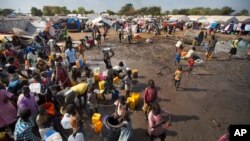The U.N. Security Council this week will begin discussing imposing sanctions on South Sudan, where two factions are caught in a long-running political dispute with no solution in sight.
South Sudan has been in a cycle of violence for more than a year. A rivalry between the country’s president, Salva Kiir, and his vice president, Riek Machar, deteriorated into open fighting, leaving thousands dead and nearly 2 million displaced and creating a humanitarian crisis.
U.N. peacekeeping chief Herve Ladsous told the 15-nation council Tuesday that both sides were continuing to mobilize and bring in new recruits, and he expressed frustration with the failure of peace talks to reach a deal.
“The government and the opposition do not seem to take the political negotiations seriously, and they appear unwilling to make the necessary compromises,” Ladsous said.
He said talks appear to be stalled on three key issues — power-sharing, security arrangements and constitutional reforms — and that the probability that either side will soften its position is low.
Attempt at mediation
The Security Council has been threatening to impose sanctions since November but held off as the Intergovernmental Authority on Development, a regional group, tried to mediate the talks.
As those talks continue to go nowhere, the council has taken the first step toward imposing sanctions. Diplomats said the United States circulated a draft resolution Tuesday among members aimed at laying the legal groundwork for sanctions.
The proposed resolution, seen by VOA, sets out the criteria for individuals and entities who could be sanctioned, including those who contribute to the conflict, obstruct reconciliation, violate human rights or block humanitarian aid efforts.
The draft measure seeks to punish spoilers with travel bans and asset freezes. It also establishes a five-member panel of experts that would gather information on possible individuals or entities to be sanctioned.
Opposition to arms embargo
What is not clear is whether the council will impose an arms embargo. In its current form, the draft says the council would consider any sanctions that would be appropriate to respond to the situation, which could include an arms embargo.
Previously, some council members have opposed an embargo, saying it would unfairly help the opposition because it is harder to monitor its arms purchases than the government’s.
Human Rights Watch’s U.N. director, Philippe Bolopion, welcomed the proposed resolution, telling VOA that council action was long overdue.
“It is a positive step," he said, "and we hope Security Council members, in particular Russia and China, will quickly go along and send a powerful signal in the country that there will now be a cost to be paid for continued attacks on civilians.”
South Sudan’s envoy, Francis Deng, tried to discourage consideration of sanctions, telling the council that such penalties would create an adversarial relationship and aggravate the situation.




